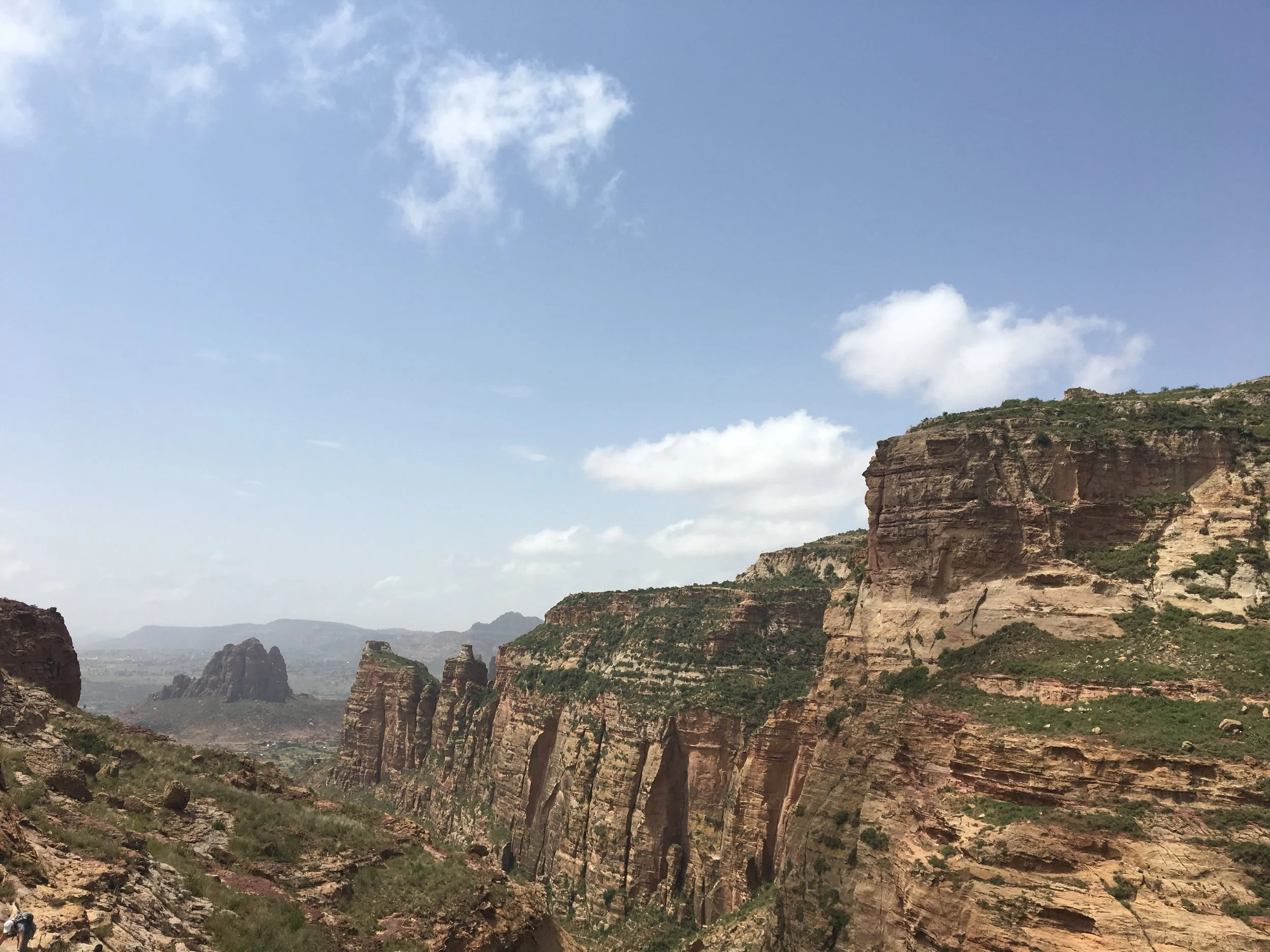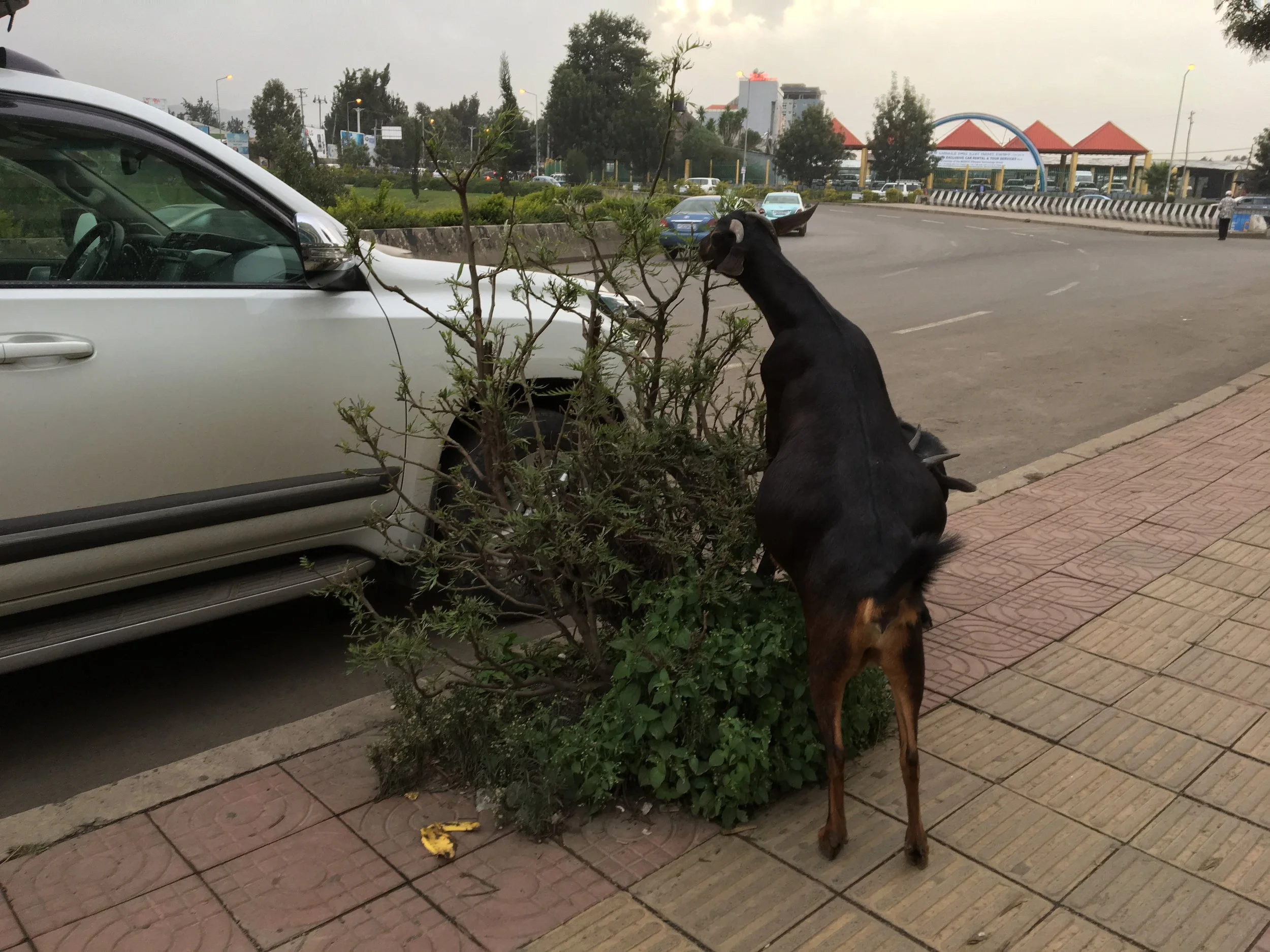The Third Month—Hidar/November
“Ripening of later cereal grains, sunny, occasional mists. Harvest, especially of early teff. Boys take cattle from sun-scorched upland to green valleys. Flirting season.” -The Wife’s Tale
The harvest of teff has begun. The farmers—tossing teff into the air with pitchforks— say hello to me as I walk by the fields on my way to school. The cows graze on the ends left uncut. The teff is laid out to dry neatly bundled, then stacked in heaps where it dries until its ready to be milled into flour. Donkeys pull carts overloaded with teff, some carry it on their backs.
We didn’t have class so that the students could sar mačat (cut grass), which had overgrown the school grounds during the rain season. Armed with scythes and machetes the students hacked at the grass while the teachers supervised. There was something calming about watching this in the cool morning. I was told the scythes were very sharp and I’d “cut my hand off” but was eventually allowed to help cut the grass and was told that I was very good at it.
Emoye, Mimi, and Girma took me to a wedding in Tiya. We arrived at a house in the woods. The wedding celebrations were brief because it started raining but I loved the moment when the wedding party—wrapped in white nutelas—was led in by donkeys, one with a pink basket of injera on its back. Brike was waiting for us at the house and was so happy to see me —I hadn’t seen her all week, I suppose because she was helping with all the wedding preparations. We returned to Kella and picked up the cows from their pasture (literally out till the cows come home) walking back quietly under the moon in the dark. We drank buna with milk and then went to sleep.
Mimi put kibä (animal fat) in my hair and told me to leave it in and wash it out the next day.After she put it in my hair she gave me a plate of honey to eat. The kibä melted into my hair and skin all day and ran into my eyes which burned. I smelled like a little sheep. The next day I washed out the kibä, Geta poured buckets of cold water over my head while I scrubbed the kibä out.
An Image
Sitting in a buna bet watching the smoke from the charcoal and the steam from the coffee rising, catching the sunlight—one of the simplest and beautiful sights of a morning, a beginning. Women wrapped in white nutelas against the lingering cold which will soon hasten to a hot afternoon. Two goats sparing in the street; one black, the other white, opposites butting heads.
Kedame/ Saturday
Saturday is market day. A woman selling fruit invited me to sit with her and gave me oranges and bananas to eat. Her name was Birtukan which is orange in Amharic. Everyone was so confused by the ferenji “selling” fruit—I kept making up different prices.
Everyday with Geta
Geta was helping me cook dinner on my charcoal stove and chopped up a piece of palo santo that I had, thinking it was firewood. My house smells so nice now, fortunately Mimi let me use some of her charcoal. Before coming to Ethiopia something like this would have frustrated me endlessly setting off my temper, but I laughed and enjoyed sitting outside under the stars watching Geta cook gomen (spinach).
Geta walked into my room with his friend and a bag of guavas which he insisted we eat every last one. The next day he walked in with his friends and a tiny fish—we transferred it to one of my empty peanut butter containers, filled it with water, and fed the fish some bread. I poked air-holes into the lid and we hid it under my bed but—alas—the fish didn’t make it.
Geta taught me a new way to cook sweet potatoes—he wrapped them in a plastic bag and put them into a pot of water to boil. I was skeptical but the bag filled with steam and then we had delicious sweet potatoes. We just peeled them and ate them! For some reason they’re white and not orange on the inside. Geta ate his with salt while I had mine plain. Geta ordered me to buy 20 birr worth of sweet potatoes and a broom (practical) from the market. I complied and was pleased when I received his approval. Geta cooked sweet potatoes then insisted we mash them up and put them in the small buna cups and flip out the molded “cakes” and top them with sugar.
Geta and I tried to make a toy car out of old plastic bottles and a piece of wood he found while the rain pounded on the tin roof. He also made a bank box to save money in which he keeps safe under my bed. Geta and I tried to fix a watch, unsuccessfully so Geta smashed it with my Swiss Army knife instead. Other things Geta and I have tried to fix: a broken zipper, a broken phone, a deflated football, and a pair of shoes. Geta—ever inventive—built a swing out of rope and an old rice bag for a seat. I took turns pushing him, Melaku, and Mitata. Other things Geta has made: a dart from the biblical like thorns that grow here, sling-shots with a stick and a rubber band, water guns with a plastic bottle with a hole poked in the top.
Reflecting on Thanksgiving
This was not my first Thanksgiving away from home and certainly won’t be my last. I went to Addis for the weekend to celebrate with other volunteers. As I drove past fields of harvested teff I had the sense that for the first time I was celebrating Thanksgiving with the coinciding reaping of crops. I’m thankful for the circumstances and opportunities that lead me to being here in Ethiopia. Feeling grateful for all the educators in the world, especially the ones I was fortunate to have from pre-school through university—and that I was able to receive a formal education. One volunteer said he was “thankful to be from a country that has a Peace Corps”—something we shouldn’t take for granted. Another volunteer said to “focus on the good” which is important no matter where you are.


